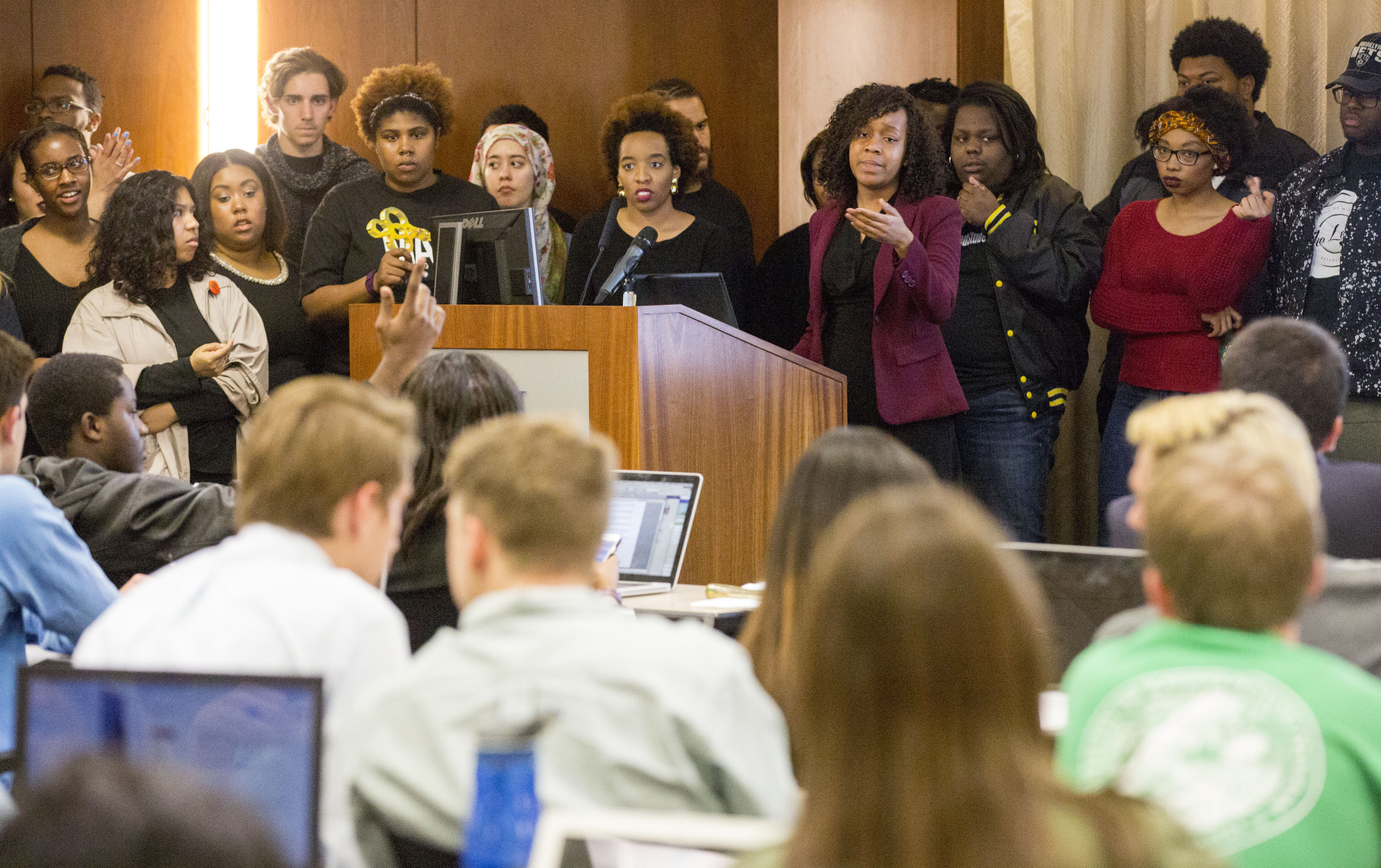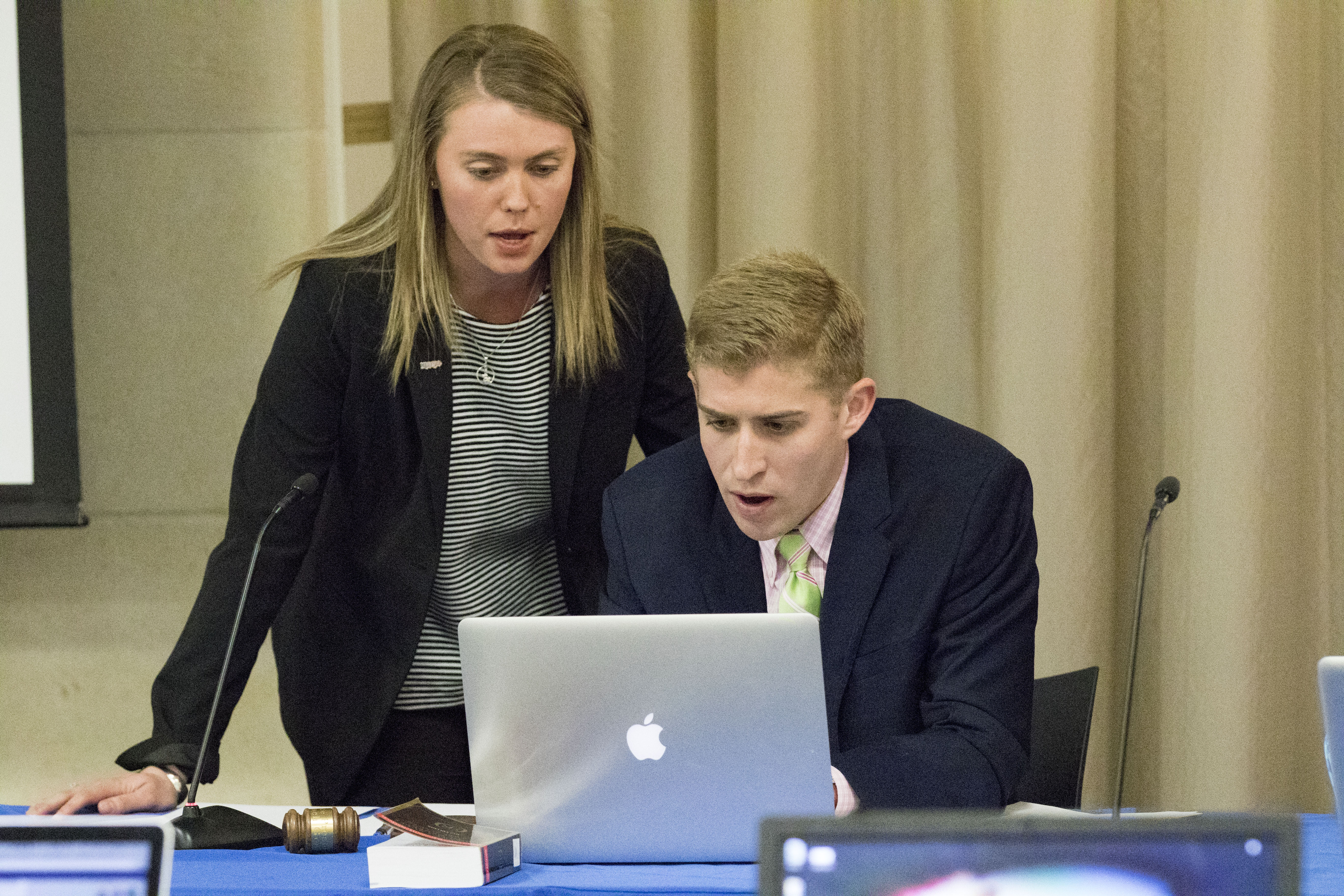KU vote funds separate, multicultural student government; organizers call move unprecedented among U.S. universities
How group will co-govern with existing Student Senate has yet to be determined

Jameelah Jones, center, and Katherine Rainey, right, speak to the Kansas University Student Senate about a proposed Multicultural Student Government fee during the Student Senate meeting Wednesday evening March 9, 2016, at the Kansas Union.
A request to establish a multicultural student government at Kansas University — which proponents said would be unprecedented among U.S. universities — was approved after intense debate Wednesday night.
The KU Student Senate voted on allocating a list of required student fees for the upcoming school year, including a $2 fee increase to fund the newly created Multicultural Student Government. The fee would generate about $90,000 annually and be disseminated through KU’s Office of Multicultural Affairs.
While many senators agreed with the concept of the new governing body, others expressed concern that more detailed logistics had yet to be established and shared because the group was so new.
More from the meeting
• Related story:KU newspaper’s fee revenue won’t be restored following Student Senate vote
• Related post:Outtakes from Wednesday’s Student Senate meeting: More on Multicultural Student Government talks and visitors from Mizzou
After a prolonged debate, senators overwhelmingly voted to approve the fee package including the recommended fee to create the Multicultural Student Government at 11 p.m. Wednesday.
Ultimately, for the new organization to function the way its leaders envision, Student Senate’s current bylaws would need to be edited to allow for the new body to have representation in decision-making, Student Senate finance committee chairman and law student Tyler Childress explained.
About 50 students of color attended Wednesday’s meeting and lined up behind proponents of the Multicultural Student Government, who presented to the full senate for the first time a written memo explaining more about their ideas for the new organization, along with a slideshow presentation.
“Multicultural students are best equipped to create spaces in which fellow multicultural students feel safe and accepted,” according to the memo. “The current Student Senate does not advocate for students of color in part due to refusal by select members, and because of lack of understanding and empathy.”
Students Jameelah Jones and Katherine Rainey stressed that the Multicultural Student Government would not be “separate but equal” and would not be divisive.
“What we do does not negate what you do, and vice versa,” Jones said. “The goal is not to pit one student body against another. That’s not our intention.”
Rainey said each of the eight executive board members would receive a $6,000 annual stipend as opposed to an hourly wage, which would enable participants to hold other campus jobs. She said elections would be held to fill the Multicultural Student Government, and that students could serve on both the Multicultural Student Government and the Student Senate.
She said the government would have “equal representation in all university spaces” and equal seats in the campus fee review process.
Rainey declined to answer questions about detailed logistics, saying it was important instead to fund the group because the Student Senate last fall had pledged its support to the Black Lives Matter movement and students of color.

Jameelah Jones, center, and Katherine Rainey, right, speak to the Kansas University Student Senate about a proposed Multicultural Student Government fee during the Student Senate meeting Wednesday evening March 9, 2016, at the Kansas Union.
“If you believe our lives matter, we are standing up here presenting to you another option to really support multiculturalism,” Rainey said. “Tonight we would also be making history — this would be the first and only multicultural student government the nation has ever seen. This would be a chance to recognize our pitfalls and want more, and want better.”
A lack of logistics was the chief problem for Student Senate Chief of Staff Adam Moon.
The allocation of resources to underrepresented students is “essential,” Moon said.
“I see a lot of good things that can come of a Multicultural Student Government, I see a lot of positives,” he said. “There is a way that this could work … yet I still have some reservations.”
Moon said the Multicultural Student Government was a completely new group. While students had been discussing it for months, it only officially formed within the past couple weeks. And $90,000 is a large allocation, he said.
“We have not funded a group that is that newly registered before,” Moon said. “I just want to understand more going forward to make sure this works.”
A number of current senators spoke in favor of funding the group, including Chancellor Adams, senator and interim president of the Black Student Union.
“At the end of the day this, right now, is going to help more people than what the Student Senate right now can help,” Adams said.

Kansas University Student Body President Jessie Pringle and Vice President Zach George talk during a recess in the Student Senate meeting Wednesday evening at the Kansas Union.
Vice provost for diversity and equity Nate Thomas also spoke on behalf of creating the new government, saying KU could be trailblazing.
He said years ago, KU’s Office of Multicultural Affairs was the result of similar student activism and that now most universities have such an office.
“One of the things to think about is opportunity, the opportunity for history,” Thomas said. “It’s an opportunity to be at the forefront and lead and be different, so all universities start thinking about what it’s like to have multicultural government.”
Mizzou visitors
A handful of black students who said they were with the University of Missouri’s Concerned Student 1950 activist group attended Wednesday’s meeting, several speaking vehemently for the separate government and complaining that leaders of the KU group had to face questions from the Student Senate.
“You guys can’t keep attacking them, because they’re getting attacked every day,” one woman said. “They’re not comfortable on their own campus that they pay to go to.”
Another Mizzou woman said that if the new government were not approved: “I guarantee you that we will come back, we will disrupt, it won’t be good.”
Newspaper funding
Included in the Student Senate’s required student fee package also was a $1 fee, totaling about $45,000, for the University Daily Kansan, keeping the student newspaper’s 2016-2017 funding at the same level as it is this year.
Kansan leaders had hoped the Senate would agree to a $2 fee, generating about $90,000 per year and restoring the student funding the Kansan had the previous year.
Kansan leaders said the funding change forced them to cut student positions and left them unable to fill their faculty adviser position. A federal lawsuit is pending, filed by current and past Kansan editors against the university, alleging that the Senate cut the Kansan’s funding because of concerns over its content.







